The Importance of UV Protection
Some of the best things in life are free, but that doesn’t mean they’re always free of unfortunate side effects. Take the glorious Florida sunshine for example. People travel from around the world to bask in its golden rays. Since all that basking can contribute to skin cancer, you can safely assume there’s a whole lot of sunscreen being purchased in the sunshine state.
The Effects of UV Rays on your Eyes
Your skin is not the only thing that needs protecting from the sun. The sun’s harmful UV rays can cause serious damage to your eyes without proper protection. In fact, studies have linked prolonged exposure to UV rays to growths or cancer in your eyes, macular degeneration, cataracts, solar retinopathy, and photokeratitis; which is essentially a sunburn on your cornea.
Risk Factors
There are external factors that can also increase the risk of UV damage to your eyes.
- Environment / Geographical Location
Snow reflects up to 80% of UV radiation, making it an absolute must to wear protective eyewear in snowy environments. Likewise, dry sand and seafoam reflect UV radiation approximately 15% and 25% respectively. - Time of Day
The time of day is a factor. Surprisingly, when the sun is at its highest around noon and UV rays are 10 times higher, the eyes are more shaded by the brow ridge, making the worst exposure time mid-morning and mid-afternoon. - Season
You might think summer is the season where the most damage can occur, but the reality is that people tend to expose themselves to the sun more consistently in the fall, spring, and winter. - Eye Color
People with lighter-colored eyes are more prone to the risk of UV damage because they have less pigment to protect their eyes than those with darker-colored eyes.
How to Protect your Eyes from UV Rays
If all of the above is starting to make a new pair of sunglasses look pretty good, that’s a great start. Try to avoid thinking of your sunglasses as just another accessory or fashion statement. It’s more important to make sure you can check off the following features in the sunglasses you’re considering.
- Block out 99% – 100% of both UVA and UVB rays.
- Darker lenses, preferably gray in color, to minimize color distortion.
- Wrap-around sunglasses that prevent as much light as possible.
- Anti-reflective coating.
- Poly-carbonate lenses for impact resistance.
Whether you’re in the sunshine state or the snow-covered mountains, you can still enjoy the great outdoors and protect your eyes while by being proactive about your eye health. If you’re experiencing vision problems related to UV damage or have concerns your eye health, contact the professionals at Tyson Eye. Our team of caring and knowledgeable experts are here to help you keep seeing all the best things in life – clearly. Contact us today to learn more or to schedule an appointment.
